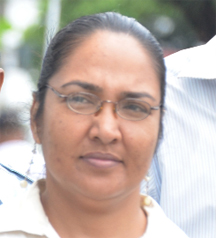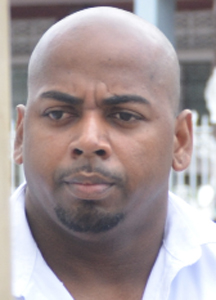Lawyers for Bibi Sharima-Gopaul and her former lover Jarvis Small, the couple found guilty of savagely murdering 16-year-old Neesa Gopaul, have filed their notice of appeal, contesting the conviction and sentencing of their clients.
On March 5th, Justice Navindra Singh sentenced Sharima-Gopaul, the girl’s mother, to 106 years in jail, while he sentenced Small, called ‘Barry, to 96 years, following a unanimous guilty verdict by a 12-member jury at the end of the High Court trial.
However, the lawyers for both Sharima-Gopaul, 42, and Small, 37, are contending that Justice Singh committed several errors during the conduct of the trial, including the admittance of evidence that was prejudicial and failing to properly direct the jury. They also say the sentences handed down were far too excessive.



In his notice of appeal, which was filed last Tuesday, Small’s attorney Lyndon Amsterdam has advanced four grounds for the challenge. He and his team say Justice Singh erred in law when he refused an application made on behalf of Small to have a separate trial and when he overturned a no-case submission made on behalf of Small and that he admitted inadmissible evidence, resulting in Small not having a fair trial. They also say the sentence was excessive, irrational and not made in accordance with any established principles of law.
In a brief interview with Stabroek News, Amsterdam expressed hope for an early hearing. “The defence is hopeful that the record will be prepared as early as possible, and that the number one, (Small), will be afforded an early hearing of his appeal,” Amsterdam said.
Meanwhile, attorney George Thomas, who represents Sharima-Gopaul, has advanced 25 grounds for his appeal.
Among other things, Thomas listed that the trial judge failed to sufficiently put his client’s defence to the jury; that the judge misdirected the jury in relation to the evidence, findings and explanations of the forensic pathologist to the extent of inconsistencies and discrepancies with the story of the main prosecution witness; and that the judge erred in law in admitting evidence, which was more prejudicial than probative, through the main prosecution witness, and failed to direct the jury on the effect of this evidence being inconsistent with other existing evidence.
Thomas is also appealing on grounds that the judge failed to sufficiently guide the jury, or at all, on how to approach the evidence, particularly in respect of circumstantial evidence and drawing inferences and that the judge failed to show how to apply the rule of drawing inferences favourable to the accused.
Cited as grounds for appeal also is the claim that the judge misdirected the jury on how to approach the evidence, particularly in respect to the nexus or connecting evidence between his client and the items associated with the death of the deceased.
Thomas is contending too that Justice Singh failed to warn the jury to disregard the misrepresentation of the evidence and the appealing to emotions stated by the prosecution in the matter.
He also has charged that that the judge failed to sufficiently direct the jury, or at all, on how to approach the evidence, particularly in respect of the issue of principal and agent, and in respect of the issue of conspiracy.
The lawyer has also advanced for appeal, that the sentence was too excessive in the circumstances; and that “more and further grounds of appeal shall be added at a later stage.”
In handing down the sentences, Justice Singh had said he was starting the sentence at 60 years for each of them. The judge then added 10 years because they premeditated the murder, 10 years because the victim was a child, 10 years for the brutality meted out to the girl and six years for the domestic violence she suffered.
Meanwhile, the judge told Sharima-Gopaul that she was being given an extra 10 years because Neesa was her child and she was supposed to protect her and not stand by and allow her to be murdered.
Main prosecution witness Simone Diane De Nobrega, who was a former cellmate of Sharima-Gopaul, said Sharima-Gopaul had confided in her that it was Small who murdered her daughter by bashing her head in with a piece of wood.
De Nobrega had said that Sharima-Gopaul related to her that Small told her that they needed to get Neesa “out of the picture” and that he eventually killed the teen in her presence.
The witness had told the court that despite her assurance to Sharima-Gopaul, she would not have been able to live with herself if she had kept such a secret. She said as a mother herself of two sons, “I couldn’t carry such a weight.” The woman added, “Neesa deserved to get justice and no matter what, Neesa didn’t deserve to die by the hands of someone she trusted; someone that was supposed to protect her.”
Both convicts have maintained that they are innocent.
Neesa Gopaul’s decomposing remains were found stuffed in a suitcase, which was discovered on October 2, 2010, anchored by several dumbbells in the creek at the Emerald Tower resort. Her head had been bashed in and the trial heard that 50% of it was gone when the recovered corpse was examined.





